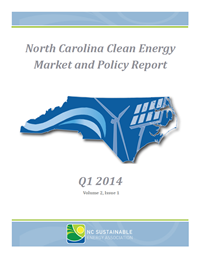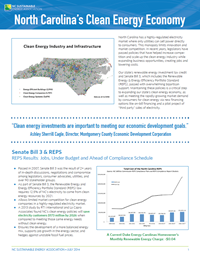The NC Sustainable Energy Association drives public policy & market development to create clean energy jobs, economic opportunities, and affordable energy to benefit North Carolina.
Founded in 1978, the North Carolina Sustainable Energy Association is a 501(c)3 nonprofit membership organization of individuals, businesses, government and non-profits interested in North Carolina's sustainable energy future. Located in Raleigh, but active statewide, the North Carolina Sustainable Energy Association is the leading nonprofit in North Carolina devoted to leading public policy change and driving market development in ways that will create clean energy jobs.
Documents
North Carolina Clean Energy Market and Policy Report Q1 2014
We are excited to present the North Carolina Clean Energy Market and Policy Report for Q1 2014, and again provide our business members insights into the clean energy industry this year.
The Q Report provides NC Sustainable Energy Association (NCSEA) members with unique insight into the numbers, trends, and variables shaping the state’s clean energy economy. To help guide your planning, the Q Report provides accurate and timely information on the NC market landscape and policy environment divided into three sections: a market overview, a legislative update, and a regulatory update.
The market overview includes key data on recently installed or registered clean energy systems within the state, as well as cumulative historical data and geographic information. The legislative section reiterates NCSEA’s Legislative Agenda for the year and highlights the new Legislative Weekly. Finally, the regulatory update features a breakdown of important regulatory actions completed, in process, or expected in the coming year. For ease of review, the regulatory actions are described in four subsections: Clean Energy Finance, Fair Transmission and Distribution Access, REPS Implementation, and Information Transparency.
North Carolina’s Clean Energy Economy
North Carolina has a highly-regulated electricity market where only utilities can sell power directly to consumers. This monopoly limits innovation and market competition. In recent years, legislators have passed policies that have helped increase competition and scale up the clean energy industry while expanding business opportunities, creating jobs and
lowering costs.
Our state’s renewable energy investment tax credit and Senate Bill 3, which includes the Renewable
Energy & Energy Efficiency Portfolio Standard (REPS), passed with overwhelming bipartisan support. Maintaining these policies is a critical step to expanding our state’s clean energy economy, as well as meeting the rapidly-growing market demand by consumers for clean energy via new financing options like on-bill financing and a pilot project of “third party” sales of electricity.




Recent Comments